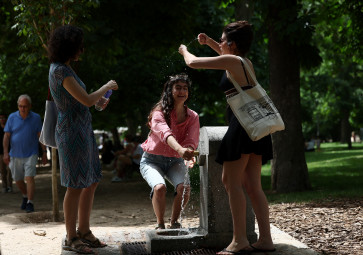Bedug' used to determine Idul Fitri
Villagers in Onje, Purbalingga, Central Java, believe the sound of the bedug (a large two-sided drum placed in a mosque) determines the end of the fasting month and the start of Idul Fitri the following day
Change text size
Gift Premium Articles
to Anyone

V
illagers in Onje, Purbalingga, Central Java, believe the sound of the bedug (a large two-sided drum placed in a mosque) determines the end of the fasting month and the start of Idul Fitri the following day.
"Yes, many of the villagers here still believe so, but they also believe that only a special person hears the bedug," said the head of the Onje subdistrict, Bangun Irianto, on Tuesday.
Bangun, however, said the sounds of the bedug were not the main way the community determined Idul Fitri.
"There was indeed a time when Muslim followers here used the bedug to decide Idul Fitri, but that was a long time ago," concurred the imam of Onje's R. Sayyid Kuning Mosque, Mohammad Maksudi, 43, who is also the leader of the Muslim sect known as Aboge.
Aboge, according to Maksudi, has its own rules about determining both Idul Fitri and the beginning of the Ramadan fasting month, which they call waljiro and donnemro.
The rules, he said, were a combination of Islamic and Javanese calendars, whose calculations were both based on the rotation of the moon.
"This year, based on our calculations, Idul Fitri fell on Tuesday according to the Javanese calendar, or Sept. 22," said Maksudi, after leading the Idul Fitri mass prayer on Tuesday morning.
However, the majority of Indonesia's Muslims celebrated Idul Fitri on Sept. 20.
"The difference is the blessing from Allah, but we will not make a problem out of it; let Allah make the judgment," Maksudi told his followers prior to Tuesday's mass prayer.
More than 500 people joined the prayer that was performed slightly differently than those conducted by the majority of the country's Muslims.
It contained two sermons, while the prayers performed by other Muslims normally contain only one.
Another difference is the amount of rice bought for the zakat fitrah alms. Instead of buying 2.5 kilograms of rice like most Muslims across the country, they buy 2.7 kilograms for the alms.
"We just want to make sure we have enough as the original amount equals 2.5 kilograms, but we don't know for sure if it is under or over so we add 200 grams just to be sure," Maksudi said.
Historically Onje is the oldest village in Purbalingga regency, where Islam is believed to have entered the regency in the 13th Century.
The R. Sayyid Kuning Mosque, Maksudi said, was built in the same century by Syech Syamsuddin, the first figure in Purbalingga to embrace Islam, and later spread the religion throughout the region.
The mosque, he added, was named after a third generation preacher, R. Sayyid Kuning, who was also the son-in-law of the king of Onje principality.
Aboge followers account for about one third of Onje's population of over 4,000, most of whom reside around the R. Sayyid Kuning Mosque in Dusun I, explained Bangun Irianto.









